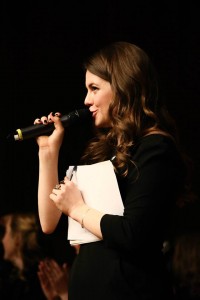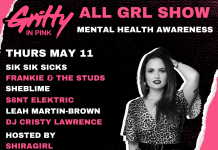The WiMN’s Front and Center is a weekly column that showcases accomplished women who work in the music and audio industries. We spotlight successful female performers, manufacturers, retailers, educators, managers, publicists, and everyone else in between. Want to be featured? Learn how here.
Front and Center: Great Lakes Regional Producer at Varsity Vocals, Emily Flanders
By Gabriella Steffenberg
Since the 2012 release of blockbuster hit Pitch Perfect collegiate a cappella has boomed in popularity as well as in notoriety. Behind the curtain, Varsity Vocals puts on the show nationwide organizing and running one of the most prestigious a cappella events.
in popularity as well as in notoriety. Behind the curtain, Varsity Vocals puts on the show nationwide organizing and running one of the most prestigious a cappella events.
Insert Emily Flanders, who has ran countless Varsity Vocal events and puts a smile on the face of anyone and everyone she meets. Paired with her invaluable pre-show pep talks, there’s no better woman to talk to before hitting the stage.
For more information on Varsity Vocals, check out their website.
WiMN: Do you currently work and/or volunteer with anyone else?
EF: I’ve just moved to Chicago, but until very recently I was working full-time for a large national nonprofit. I volunteer my time for the Contemporary A Cappella Society of America, where I’m in my fifth year as Concert and Professional Showcase producer of BOSS, an educational a cappella festival in Boston. I’ve have also volunteered for 826 Boston and a few other local non-profits. I’m looking forward to getting more involved in Chicago.
WiMN: Describe what your experience has been like at Varsity Vocals.
EF: I attended my first ICCA Quarterfinal in 2005, and loved how it brought so many groups together. I started shadowing the then-producer of the Midwest to get involved. When I finished school, I contacted Varsity Vocals’ Executive Director Amanda Newman and started working as a producer not long after! I have worked in both the Midwest and Northeast regions. Now that I’ve relocated to Chicago, I’ll be taking over as the Great Lakes Regional Producer.
Varsity Vocals has really evolved over the past few years, and our team is nothing short of spectacular. All the regions have nuanced differences, but we work incredibly hard to uphold the high standards of the organization across all our shows. The fact that we have so many long-term producers is a testament to how much we believe in what we do, and also a testament to Amanda’s leadership.
There is something magical about working on a show from beginning to end, from booking the venue to handing out awards on stage. I know how hard every single competing a cappella group works to get to that stage because I’ve been there myself, and the groups are my motivation. My work allows students to have a venue to not just perform, but share something special with their group, their loved ones, and an audience. Varsity Vocals gives us that platform.
WiMN: The popularity of the ICCA (the International Championship of Collegiate A Cappella) has boomed since the release of the a cappella movie, Pitch Perfect. What kind of changes have you witnessed?
EF: We are grateful our audience has expanded and that more people know and love a cappella because of Sing It On, The Sing Off, and Pitch Perfect. It’s allowed us to work in larger venues, like Boston Symphony Hall and New York’s Beacon Theatre, and has exposed more people to the art form. The more people inspired, the better – hopefully, it leads to local schools and communities supporting their own a cappella groups/music programs in general.
WiMN: Tell us about how a cappella has shaped your life, specifically in your college years.
EF: I grew up performing in musicals, choirs, and community theater, but my first experience singing small-group a cappella was at Interlochen Arts Camp at 13.
I auditioned for a madrigal group subset of our choir, and was hooked. Tight harmonies, minute dynamic changes, the importance of blend – it was exhilarating and terrifying to be responsible for not just my own performance, but for the well-being of the collective. I took all the performance opportunities I could from that point on, and in college I sang with the Washington University Amateurs. We competed in ICCA, we toured the country, and even got to record “The Luckiest” with Ben Folds and open his concert at the Ryman in Nashville.
More importantly than performing, though, were the lessons I learned. A Cappella groups typically come together through auditions; with music as a sole common interest, you get a lot of interesting personalities. We fought, laughed, fumed, loved, and then laughed some more. We were a family of differently minded people with semi-finished prefrontal cortexes, but we really cared about one another and the music. The Amateurs shaped who I am as a person, and I’m grateful to still have those friendships today.
WiMN: What do you enjoy doing in your free time?
EF: Reading, cooking, writing letters, going dancing with friends, voting.
WiMN: Who is your favorite musician at the moment and what about them inspires you?
EF: Janelle Monáe is an incredibly inspiring human, musician, activist, and an unapologetic QUEEN. She lives boldly, and her music reflects that. I really admire the way she uses her art to direct attention – not for her benefit, but for the causes she supports and the greater good. We should all be so driven and brave.
WiMN: Do you have a woman in the music industry that you look up to?
EF: In my specific corner of the industry, I admire Amanda Newman’s work ethic and courage under fire. She gets a lot of heat from competitors, angry parents, and people who tell her how to run her business. I’ve also seen men take credit for what she’s built. She remains collected under pressure, keeps her head down, and pushes forward while protecting her organization and staff.
Also, I admire any woman in music today who works behind the scenes, and those who have worked hard to make that possible in the past – all without being center stage. There is still much work to be done – it’s mostly still the “man behind the curtain” on the production side of things (whether that be live or recorded music). I admire women who work hard to gain the skills they need to do what they love.
WiMN: What’s a piece of advice you have for women who want to break into the a cappella industry?
EF: This community is continuously growing, but you may have to make a role for yourself if you want to make it a full-time profession. Most of us doing anything are doing so for free or part-time. Don’t feel limited by the available paying jobs out there – if you know that you want to do this professionally, be real with yourself about your current abilities and then work hard to make it happen.
I adhere to Ann Friedman’s Shine Theory, which is great for any industry, including music. By surrounding yourself with other successful women, you will learn and be inspired, have great ladies to back you up, and have the “associated power of awesomeness.” Don’t compete, befriend. Don’t be the artist who won’t hire a great bassist because you don’t want another blonde woman on stage. Don’t make excuses and say you “always are better friends with dudes.” Don’t allow others to treat you as a token female. Be better, and remember: true confidence doesn’t come by cutting other great women down. “I don’t shine if you don’t shine.”
WiMN: What are your goals for the upcoming year?
EF: Work hard, keep listening, and find inspiration everywhere I can. Also, I should probably eat fewer gummi candies.








